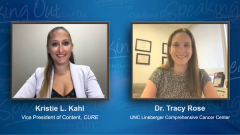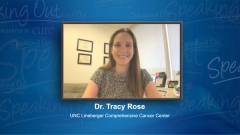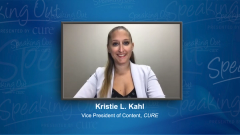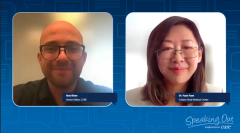
Patients Can Help Move the Needle Forward in Bladder Cancer Clinical Trials With Participation
As part of its “Speaking Out” video series, CURE spoke with Dr. Tracy L. Rose, on behalf of the Bladder Cancer Advocacy Network, about how patients can find clinical trials they may be eligible for.
Episodes in this series

Kristie L. Kahl: When we talk about clinical trials, what are some of the common misperceptions that are associated with them?
Tracy L. Rose: We hear a lot of them. The truth is that clinical trials are research, meaning that they are studying, typically, an intervention that the research community hopes is going to be better than the standard of care, or an alternative to standard of care, that might be better for some reason. If we knew it was better than standard of care, it wouldn't be a clinical trial, it would just be the standard of care.
There is some uncertainty in it, which is what drives the “guinea pig” comment. But that being said, all clinical trials are vetted and reviewed to make sure that they're ethical, meaning that the risk of harm is substantially less than the chance of benefit. The common misconception I hear a lot in cancer clinical trials is that it's pretty rare for people to be given a placebo or a sugar pill. And when that happens, it does occasionally, it's typically in a situation where the standard of care would be to just watch people. So if people have active advanced cancer, which is a lot of our clinical trials in the cancer world, typically there is no chance that you're going to get a placebo or a sugar pill, and that most people receive treatment that is at least hoped to be active and improved care.
So that's a really important question to ask right away and make sure is there a choice in what treatment is received? And if not, is there a chance that you'll get nothing? And if you didn't go on the clinical trial, what would the treatment be? So I think that's one of the most common misperceptions most of the time. People do get active treatment and it's not going to be a placebo or a sugar pill on the study.
Kahl: Why is it important to consider joining a trial and what are some of the benefits from actually being on a trial?
Rose: Clinical trials are really how we advance care in the cancer world. If you don't participate in a clinical trial, typically you'll get standard care. But unfortunately, in the world of bladder cancer and other cancers, standard care is not curative for everybody, or in the setting of more advanced bladder cancers for most people. And so we all hope to do better in the future. And the way that we do this is through clinical trials.
One of the benefits for most clinical trials is you have a chance of getting treatment that's better than what you could get off trial. Now, I say a chance because we don't know that it's better. And so that's part of participating in the study. But you tend to have the opportunity to see treatments that might be better than the standard of care. And, most of the studies are designed because we think that that's likely to be the case, although not all trials are what we call positive trials or work. But they give you the chance of participation, which is not something you can typically get. So the newer drugs, the drugs in development, some of the more exciting things that we think really could lead to better outcomes are in clinical trials.
The other benefit is that you get pretty intense protocol management. Most people who are on clinical trials have a study coordinator, who is really dedicated to making sure that all their appointments are when they're supposed to be, that their side effects are monitored really closely, that they get all the follow-up they need. So sometimes it can be really helpful actually, to just navigate the system. It's rare to get paid for a clinical trial in cancer. But some of the studies will help with things like gas or transportation, depending on the study. So that's always a good question to ask, too.
The other benefit, obviously, is that you're contributing to the research community, you're contributing to improving care for other people, and who are in your shoes down the line. And that's really powerful and motivating for a lot of my patients. Sometimes they'll even say to me, “Even if this study and this drug you're testing doesn't work, at least I've helped someone.” And so I think that's a really big driver for a lot of patients.
Kahl: How can patients find out more about trials and if they're even eligible for a trial?
Rose: Yeah, so this has actually been a challenge that BCAN, the Bladder Cancer Advocacy Network, has tried to help address. But all of us work very hard to make sure that our patients are aware of whatever clinical trials are available. The most standard answer is that there's a website that the federal government runs, called clinicaltrials.gov, that lists every single clinical trial that's open here in the country, and lists the criteria for eligibility. That being said, that website can be a challenge to navigate to find the clinical trials that are applicable to you, and to see if you're eligible for and so BCAN tries to also keep a list and hook people up with clinical trials that are active in bladder cancer.
I think that this is a really good question to ask your oncologist or your care team: Do you have clinical trials? If you don't, do you know of any? Can you search clinicaltrials.gov with me? And if you don't know the answer, who can I visit that might know if they have clinical trials with my area? Most of us who run clinical trials keep an active list of all the studies that are going on, and where are they and depending on the patient's needs and wants, we try to help target people to clinical trials, if that's what they want, as well as run them ourselves. But it's really something sometimes patients have to seek out because if you go see an oncologist locally, and they don't have any clinical trials there, they may not even mention it to you or to your caregiver. And so it's something that's sometimes very patient driven. And I always encourage people, if they're interested in a clinical trial to really reach out and even go on clinicaltrials.gov. There's always a contact and an email for each study that you can even email to see if you would potentially be eligible.
Kahl: Can you discuss some of the resources that BCANn has to help patients learn more about trials?
Rose: BCAN has done a really nice job in this area, they've really tried to tackle this problem where it's just very difficult for patients to find clinical trials. Their website has some great information about the types of clinical trials. So we talk about phase 1, phase 2, phase 3 trials and what those mean, and they also have a search engine where you can actually put in the stage of disease and the state and search for clinical trials within their website, and that can be easier to use than the clinicaltrials.gov site and can really help people identify studies.
Transcription edited for clarity and conciseness.








